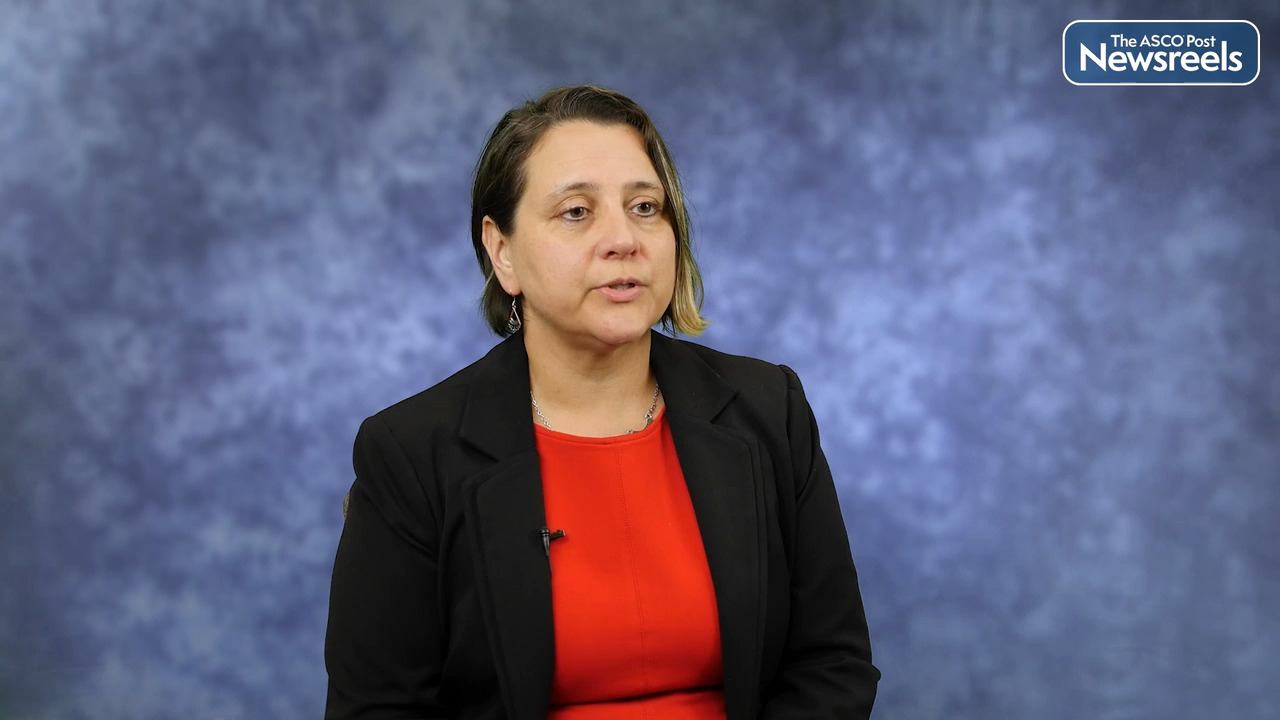Midhun Malla, MD, on Metastatic Colorectal Cancer: Treatment Updates
NCCN 2023 Annual Conference
Midhun Malla, MD, of the West Virginia University Cancer Institute, discusses the molecular landscape of metastatic colorectal cancer and the development and approvals of targeted treatments. Dr. Malla also details the range of HER2-targeted therapeutic options and the approval of trastuzumab and tucatinib for HER2-amplified disease in the second-line setting or after. In addition, he discusses emerging therapies in refractory metastatic colorectal cancers followed by circulating tumor DNA–guided management of oligometastatic colorectal cancers using immune checkpoint inhibitors.
Transcript
Disclaimer: This video transcript has not been proofread or edited and may contain errors.
Midhun Malla, MD:
The treatment landscape of metastatic colorectal cancers is evolving and is advancing towards personalized biomarker guided management, which has led to change in the trajectory of approval of medications since 2017.
Let's start with focusing on HER2, HER2 is a protein amplified in three to five percentage of patients with metastatic colorectal cancers. Unlike 30% of the patients with breast cancers, despite the small numbers, patients with HER2 amplified metastatic colorectal cancers have a unique tumor Biology. EGFR inhibitors play a key role in the management of metastatic colorectal cancers. However, HER2 amplification has been determined to be a negative predictive biomarker for EGFR inhibitor response with also inferior survival outcomes. This once again stresses the importance of tumor sequencing in every individual patient with metastatic colorectal cancer.
Trastuzumab and tucatinib combination has been recently approved by FDA based off of MOUNTAINEER phase II study. This combination has led to significant improvement in objective response rates of 38% compared to 2% with tucatinib alone suggestive of synergistic activity of the combination. The combination has also been found to be manageable in terms of safety profile. Another target therapy for HER2 in colorectal cancers is fam trastuzumab deruxtecan nxki also called T-DXd. It is a humanized monoclonal antibody with topoisomerase inhibitor. Payload that has shown to increase objective response rates of up to 45% in a cohort of 53 patients with metastatic colorectal cancers with HER2 amplified tumors. T-DXd has shown to increase objective response rates even in patients who previously were treated with HER2 targeted therapy, which is a unique characteristic of this drug.
Extending on the lines of targeted therapy, KRAS G12c is another exciting target in metastatic colorectal cancers, although it is a rare target, but an aggressive combination with Cetuximab has been shown to improve objective response rates of up to 46% compared to 19% objective response rates with an aggressive alone. This combination has led to breakthrough therapy designation by FDA. This marks another exciting step towards precision biomarker guided management of colorectal cancers. SUNLIGHT study, which studied the combination of trifluridine and tipiracil with bevacizumab, had led to significant improval in overall survival and progression survival compared to trifluridine and tipiracil alone. This is one of the first phase III randomized studies that has a comparator arm with an active therapy rather than a placebo in the refractory metastatic colorectal cancer space. The combination has also been found to be manageable with improvement in quality of life compared to trifluridine, tipiracil alone.
Finally, oligometastatic deficient MMR/MSI high colorectal cancer space is also making further progress. KEYNOTE-177 study had led to approval of pembrolizumab in metastatic colorectal cancer patients with deficient MMR/MSI high tumors in the frontline setting. And MSI high deficient MMR is a fascinating biomarker in all solid tumors, including colorectal cancers. Circulating tumor DNA guided management of oligometastatic colorectal cancers with deficient MMR/MSI high has been focused in the presentation.
Circulating tumor DNA is defined as cell-free DNA n a, released by circulating tumor cells into circulation after apoptosis or necrosis. The data suggests that about 25% of the patients with oligometastasis to the liver from colorectal cancers tend to have detectable circulating tumor DNA after resection of liver metastasis. About 83% of these patients were shown to have recurrence. However, those patients who were treated with adjuvant therapy and a reduction or who cleared the circulating tumor DNA, only 30% of the patients had a re recurrence. Whereas patients who had persistent circulating tumor DNA after adjuvant therapy, 100% of the patient had recurrence of their tumor. So this is another exciting prospect of management in the space of colorectal cancers, of utility, of circulating tumors DNA, and we need more clinical trials to be focusing in the space.
The ASCO Post Staff
Michael K. Gibson, MD, PhD, of Vanderbilt-Ingram Cancer Center, discusses the importance of developing additional treatment strategies for patients with advanced or metastatic esophageal squamous cell carcinoma and describes the role of immune checkpoint inhibitors. Dr. Gibson also reviews the available evidence on the use of nivolumab in this patient population.
The ASCO Post Staff
Mandi L. Pratt-Chapman, PhD, of the George Washington University Cancer Center, discusses the specific health-care needs for cancer screening, treatment, and survivorship among members of the LGBTQI+ community. Because clinical practices and research studies do not routinely collect sexual orientation and gender identity data, there is insufficient evidence to guide clinical care decision-making, Dr. Pratt-Chapman says.
The ASCO Post Staff
Ella A. Kazerooni, MD, of the University of Michigan Rogel Cancer Center, discusses reducing cancer deaths in the United States by identifying patients at risk for lung cancer. Engaging with primary care physicians and facilitating referrals are keys to a successful lung cancer screening program, she says, as is working with a nurse care coordinator.
Natalie Moryl, MD, of Memorial Sloan Kettering Cancer Center, discusses severe cancer pain, a medical emergency that should be addressed with immediate intervention. The treatment plan, Dr. Moryl says, should include making a pain diagnosis; addressing reversible causes of pain such as spinal cord compression, fracture, or obstruction; selecting, titrating, and rotating opioids and co-analgesics; and routine screening for risks of opioid use disorder and mental health comorbidities.
The ASCO Post Staff
Elena Ratner, MD, MBA, of Yale Cancer Center/Smilow Cancer Hospital, discusses sexuality, intimacy, fertility, and menopause as important aspects of women’s cancer survivorship and the many effects of treatment on these issues. They often go unacknowledged in the medical community, Dr. Ratner says, because of a lack of knowledge and resources. She describes interventions, including holistic, hormonal, behavioral, psychological, and interdisciplinary approaches.





